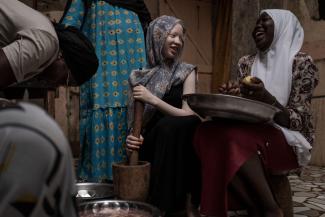Albinism
A dangerous superstition
 picture-alliance/AA/Annika Hammerschlag
A family in Senegal.
picture-alliance/AA/Annika Hammerschlag
A family in Senegal.
Due to the deeply rooted superstition that the body parts of people with albinism possess magical powers, they and their families are often confronted with dangerous myths and perceptions. Sometimes mothers are accused of infidelity with white men or ghosts and expelled from their family. The myth that sexual intercourse with a woman with albinism can cure infertility and AIDS places them at high risk of sexual violence and infection with HIV. In the worst cases, newborns are killed immediately after birth, or children and adults are attacked, kidnapped, mutilated or murdered. The graves of people with albinism are also plundered. Their body parts are used to make occult talismans, which is a lucrative business.
Moreover, many people with albinism on the African continent either receive inadequate schooling and professional opportunities or none at all. Thus, they are robbed of the possibility of achieving financial security.
In Tanzania and Malawi, people with albinism experience violence disproportionately often. The organisation Standing Voice reports that since 2006, approximately half of all human-rights violations in Africa that were associated with albinism were registered in these two countries, especially in the regions of Machinga in Malawi and Mwanza in Tanzania. In neighbouring countries like the Democratic Republic of the Congo, Mozambique, Burundi, Zambia and others, human-rights violations have also been registered and transnational organ trading has been reported.
Understanding genetics
Protecting people with albinism from discrimination and racism means understanding the genetic context, learning about their particular physical limitations and need for assistance and creating a social environment in which their rights are respected at the local and national level.
Albinism is a rare congenital metabolic disorder with an estimated prevalence of one in 20,000. The condition is much more common in Africa, where it can affect one in 1000 people. In some parts of the continent, about every twentieth person carries the defective gene without showing any manifestation of the disease. This prevalence can vary greatly from region to region, however. If both parents carry the defective gene, their child has a 25 % chance of being born with albinism, even if the father and mother are phenotypically healthy.
Groundbreaking judgment
The previous negligence with regard to crimes against people with albinism is changing. In 2022, for the first time, the High Court in Malawi found a Catholic priest, a police officer and a clinician guilty of the joint murder and sale of the body parts of a young man with albinism. All three were given lifelong prison sentences. The judgment was groundbreaking not least because prominent members of society were convicted – even though in many countries the countless criminals who are perpetuating these horrible traditions are still not being punished. The judgment is one indication that public interest and social pressure have increased to the extent that these crimes are now being prosecuted.
Two historic resolutions to protect people with albinism helped spur this change. In November 2014, the UN General Assembly declared 13 June „International Albinism Awareness Day“. Since then, it has been celebrated annually worldwide and given people with albinism a voice. Ikponwosa Ero, a lawyer from Nigeria, was appointed the first independent UN expert on the enjoyment and defence of the human rights of persons with albinism in 2015; the jurist Muluka-Anne Miti-Drummond from Zambia took over the office in 2021.
Furthermore, in 2019, the Executive Council of the African Union adopted an action plan for the entire continent to end human-rights abuses of people with albinism in Africa. Even though such measures are not legally binding, they form a crucial foundation for the protection of this genetic minority. Other international campaigns by human-rights organisations and the UN aim to increase awareness of the threats that people with albinism face, particularly in sub-Saharan Africa. Various organisations like Standing Voice, Africa Albinism Network, Albinism Society of Kenya, Black Albinism, Under the Same Sun, Tanzania Albinism Society, Albinism Foundation Zambia, Positive Exposure and the National Organization for Albinism and Hypopigmentation (NOAH), among others, are directly involved in the social and medical protection and support of these people at the local and national level. Promoting the inclusion and strengthening the self-confidence of people with albinism are important measures too.
Despite these positive developments, there are still children with albinism who live apart from their families in boarding schools and safe houses in order to protect them from danger. Too many people still believe the superstition. People with albinism still disappear and are mutilated or killed; murder cases remain unsolved. The estimated number of people who have disappeared and whose fate is unknown remains high.
Providing scientific education about the genetic causes of albinism in schools is therefore an essential tool to spread knowledge to all segments of the population and to finally lay a centuries-old superstition to rest.
Link
www.albinism-justagene.com
Gudrun A. Rappold is a professor emerita and former chair of the department of human molecular genetics in Heidelberg University Medical School.
gudrun.rappold@med.uni-heidelberg.de


